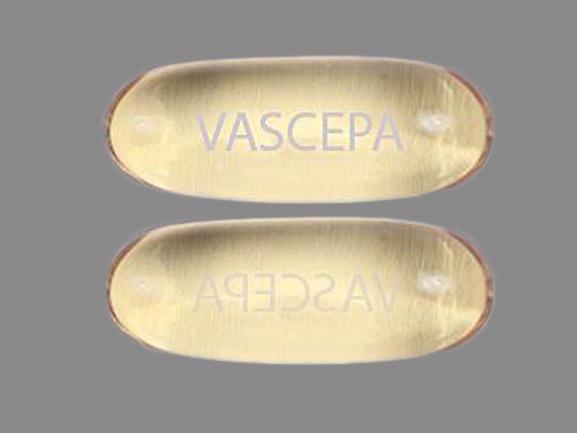Vascepa Disease Interactions
There are 3 disease interactions with Vascepa (icosapent).
Icosapent (applies to Vascepa) atrial fibrillation/flutter
Moderate Potential Hazard, Moderate plausibility. Applicable conditions: Arrhythmias
Icosapent is associated with an increased risk of atrial fibrillation or atrial flutter requiring hospitalization. In a cardiovascular outcomes trial, the incidence of atrial fibrillation was greater in patients with history of atrial fibrillation or atrial flutter; caution is recommended in these patients.
References (1)
- (2019) "Product Information. Vascepa (icosapent)." Amarin Pharmaceuticals Inc, SUPPL-35
Icosapent (applies to Vascepa) fish allergy
Moderate Potential Hazard, Moderate plausibility. Applicable conditions: Allergies
Icosapent ethyl is obtained from the oil of fish. It is unknown if patients with allergies to fish and/or shellfish are at increased risk of an allergic reaction to this drug. Use with caution in patients with known hypersensitivity to fish and/or shellfish; advise such patients about the potential for allergic reactions to this drug.
References (1)
- (2019) "Product Information. Vascepa (icosapent)." Amarin Pharmaceuticals Inc, SUPPL-35
Icosapent (applies to Vascepa) liver disease
Moderate Potential Hazard, Moderate plausibility.
In patients with liver dysfunction, ALT and AST levels should be monitored periodically during therapy with icosapent; caution is recommended in these patients.
References (1)
- (2019) "Product Information. Vascepa (icosapent)." Amarin Pharmaceuticals Inc, SUPPL-35
Switch to consumer interaction data
Vascepa drug interactions
There are 76 drug interactions with Vascepa (icosapent).
More about Vascepa (icosapent)
- Vascepa consumer information
- Check interactions
- Compare alternatives
- Pricing & coupons
- Reviews (119)
- Drug images
- Side effects
- Dosage information
- Patient tips
- During pregnancy
- Generic availability
- FDA approval history
- Drug class: miscellaneous antihyperlipidemic agents
- En español
Related treatment guides
Drug Interaction Classification
| Highly clinically significant. Avoid combinations; the risk of the interaction outweighs the benefit. | |
| Moderately clinically significant. Usually avoid combinations; use it only under special circumstances. | |
| Minimally clinically significant. Minimize risk; assess risk and consider an alternative drug, take steps to circumvent the interaction risk and/or institute a monitoring plan. | |
| No interaction information available. |
See also:
Further information
Always consult your healthcare provider to ensure the information displayed on this page applies to your personal circumstances.


